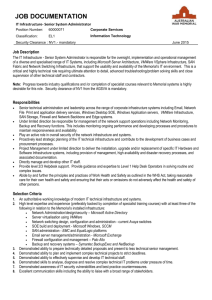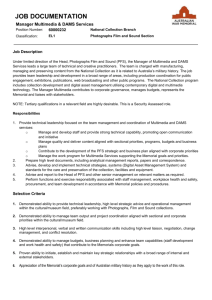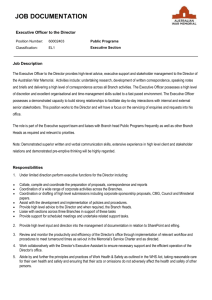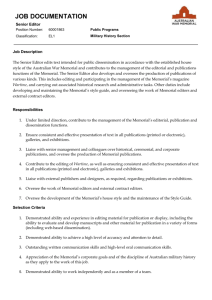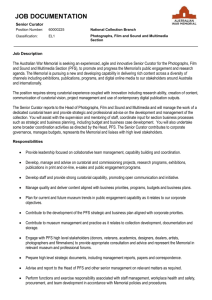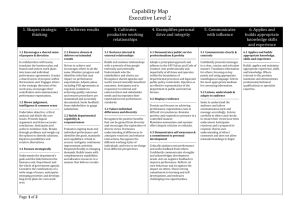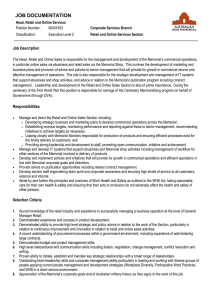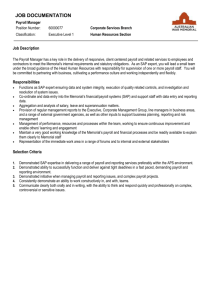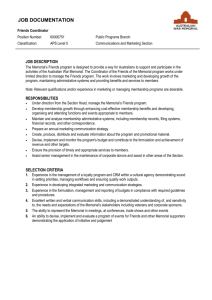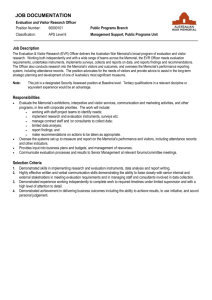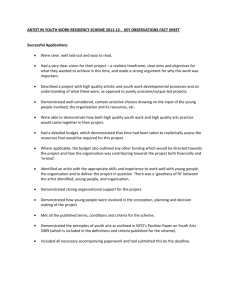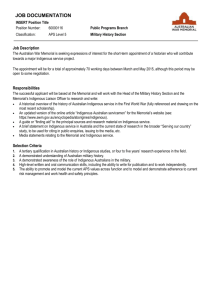Job Documentation - EL 1 Senior Historian
advertisement
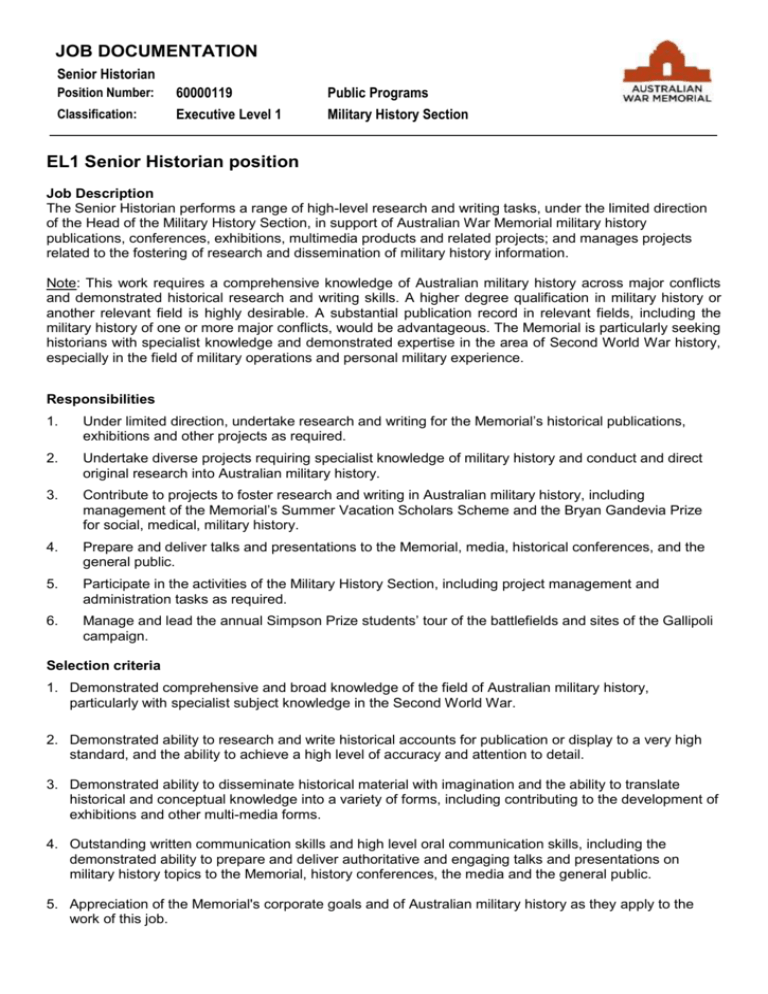
JOB DOCUMENTATION Senior Historian Position Number: 60000119 Public Programs Classification: Executive Level 1 Military History Section EL1 Senior Historian position Job Description The Senior Historian performs a range of high-level research and writing tasks, under the limited direction of the Head of the Military History Section, in support of Australian War Memorial military history publications, conferences, exhibitions, multimedia products and related projects; and manages projects related to the fostering of research and dissemination of military history information. Note: This work requires a comprehensive knowledge of Australian military history across major conflicts and demonstrated historical research and writing skills. A higher degree qualification in military history or another relevant field is highly desirable. A substantial publication record in relevant fields, including the military history of one or more major conflicts, would be advantageous. The Memorial is particularly seeking historians with specialist knowledge and demonstrated expertise in the area of Second World War history, especially in the field of military operations and personal military experience. Responsibilities 1. Under limited direction, undertake research and writing for the Memorial’s historical publications, exhibitions and other projects as required. 2. Undertake diverse projects requiring specialist knowledge of military history and conduct and direct original research into Australian military history. 3. Contribute to projects to foster research and writing in Australian military history, including management of the Memorial’s Summer Vacation Scholars Scheme and the Bryan Gandevia Prize for social, medical, military history. 4. Prepare and deliver talks and presentations to the Memorial, media, historical conferences, and the general public. 5. Participate in the activities of the Military History Section, including project management and administration tasks as required. 6. Manage and lead the annual Simpson Prize students’ tour of the battlefields and sites of the Gallipoli campaign. Selection criteria 1. Demonstrated comprehensive and broad knowledge of the field of Australian military history, particularly with specialist subject knowledge in the Second World War. 2. Demonstrated ability to research and write historical accounts for publication or display to a very high standard, and the ability to achieve a high level of accuracy and attention to detail. 3. Demonstrated ability to disseminate historical material with imagination and the ability to translate historical and conceptual knowledge into a variety of forms, including contributing to the development of exhibitions and other multi-media forms. 4. Outstanding written communication skills and high level oral communication skills, including the demonstrated ability to prepare and deliver authoritative and engaging talks and presentations on military history topics to the Memorial, history conferences, the media and the general public. 5. Appreciation of the Memorial's corporate goals and of Australian military history as they apply to the work of this job. JOB DOCUMENTATION Senior Historian Position Number: 60000119 Public Programs Classification: Executive Level 1 Military History Section Capabilities Shapes Strategic Thinking Achieves results Inspires a sense of purpose and direction Translates the strategy into operational goals and creates a shared sense of purpose within the business unit. Engages others in the strategic direction of the work area, encourages their contribution and communicates expected outcomes. Builds organisational capability and responsiveness Evaluates ongoing project performance and identifies critical success factors. Instigates continuous improvement activities. Responds flexibly to changing demands. Builds teams with complementary skills and allocates resources in a manner that delivers results. Focuses strategically Understands the organisation's objectives and links between the business unit, organisation and the whole of government agenda. Considers the ramifications of a wide range of issues, anticipates priorities and develops long-term plans for own work area. Harnesses information and opportunities Gathers and investigates information from a variety of sources, and explores new ideas and different viewpoints. Probes information and identifies any critical gaps. Maintains an awareness of the organisation, looks for recent developments that may impact on own business area and finds out about best practice approaches. Shows judgment, intelligence and commonsense Undertakes objective, critical analysis and distils the core issues. Presents logical arguments and draws accurate conclusions. Anticipates and seeks to minimise risks. Breaks through problems and weighs up the options to identify solutions. Explores possibilities and creative alternatives. Marshals professional expertise Values specialist expertise and capitalises on the knowledge within the organisation as well as consulting externally as appropriate. Manages contracts judiciously. Contributes own expertise to achieve outcomes for the business unit. Steers and implements change and deals with uncertainty Establishes clear plans and timeframes for project implementation and outlines specific activities. Responds in a positive and flexible manner to change and uncertainty. Shares information with others and assists them to adapt. Ensures closure and delivers on intended results Strives to achieve and encourages others to do the same. Monitors progress and identifies risks that may impact on outcomes. Adjusts plans as required. Commits to achieving quality outcomes and ensures documentation procedures are maintained. Seeks feedback from stakeholders to gauge satisfaction. Cultivates Productive Working Relationships Nurtures internal and external relationships Builds and sustains relationships with a network of key people internally and externally. Recognises shared agendas and works toward mutually beneficial outcomes. Anticipates and is responsive to internal and external client needs. Facilitates cooperation and partnerships Brings people together and encourages input from key stakeholders. Finds opportunities to share information and ensures that others are kept informed of issues. Fosters teamwork and rewards cooperative and collaborative behaviour. Resolves conflict using appropriate strategies. Values individual differences and diversity Recognises the positive benefits that can be gained from diversity and encourages the exploration of diverse views. Harnesses understanding of differences to anticipate reactions and enhance interactions. Recognises the different working styles of individuals, and tries to see things from different perspectives. Guides, mentors and develops people Encourages and motivates people to engage in continuous learning, and empowers them by delegating tasks. Agrees clear performance standards and gives timely praise and recognition. Makes time for people and offers full support when required. Delivers constructive feedback in a manner that gains acceptance and achieves resolution. Deals with under-performance promptly. Exemplifies personal drive and integrity Communicates with influence Demonstrates public service professionalism and probity Adopts a principled approach and adheres to the APS Values and Code of Conduct. Acts professionally and impartially at all times and operates within the boundaries of organisational processes and legal and public policy constraints. Operates as an effective representative of the organisation in public and internal forums. Communicates clearly Confidently presents messages in a clear, concise and articulate manner. Translates information for others, focusing on key points and using appropriate, unambiguous language. Selects the most appropriate medium for conveying information and structures written and oral communication to ensure clarity. Engages with risk and shows personal courage Provides impartial and forthright advice. Challenges important issues constructively, stands by own position and supports others when required. Acknowledges mistakes and learns from them, and seeks guidance and advice when required. Commits to action Takes personal responsibility for meeting objectives and progressing work. Shows initiative and proactively steps in and does what is required. Commits energy and drive to see that goals are achieved. Displays resilience Persists and focuses on achieving objectives even in difficult circumstances. Remains positive and responds to pressure in a controlled manner. Maintains momentum and sustains effort despite criticism or setbacks. Demonstrates self awareness and a commitment to personal development Critically analyses own performance and seeks feedback from others. Confidently communicates strengths and acknowledges development needs. Acts on negative feedback to improve performance. Reflects on own behaviour and recognises the impact on others. Shows strong commitment to learning and self-development, and embraces challenging new opportunities. Listens, understands and adapts to audience Seeks to understand the audience and tailors communication style and message accordingly. Listens carefully to others and checks to ensure their views have been understood. Anticipates reactions and is prepared to respond. Checks own understanding of others’ comments and does not allow misunderstandings to linger. Negotiates persuasively Approaches negotiations with a strong grasp of the key issues, having prepared well in advance. Understands the desired objectives and associated strengths and weaknesses. Anticipates the position of the other party, and adapts approach accordingly. Encourages the support of relevant stakeholders. Encourages debate and identifies common ground to facilitate agreement and acceptance of mutually beneficial solutions.
